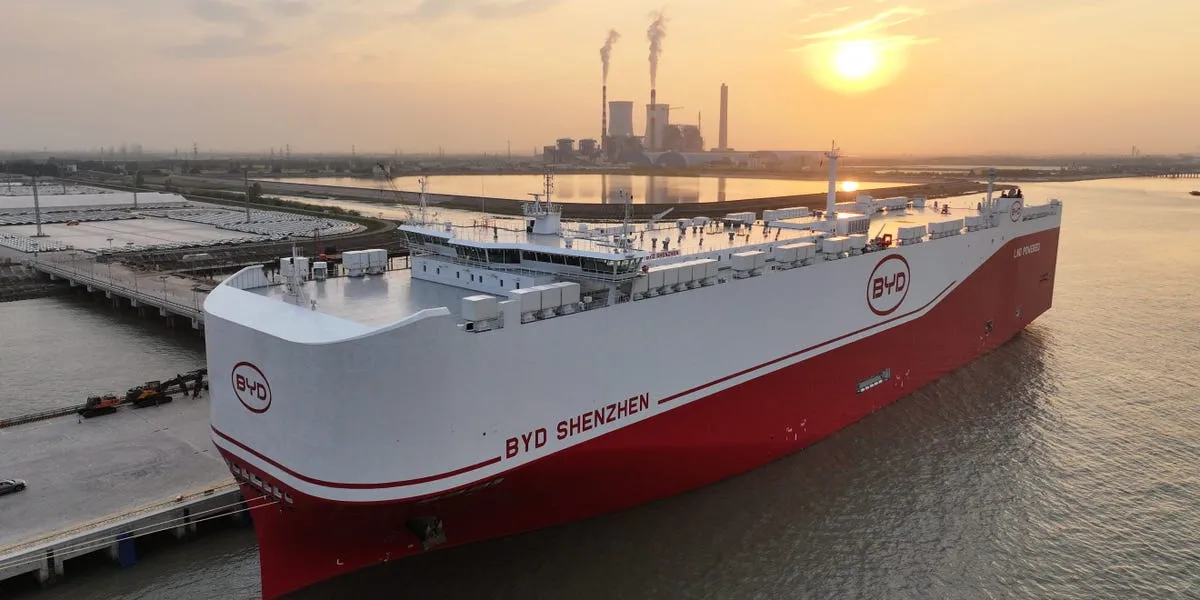
In October 2022, Elon Musk faced a significant challenge as Tesla struggled to meet its sales targets. The company experienced a critical shortage of ships needed for delivering its electric vehicles (EVs). Musk highlighted the issue to investors, stating, "There weren't enough boats, there weren't enough trains, there weren't enough car carriers." This shortage resulted in Tesla delivering tens of thousands fewer cars than it produced in the previous quarter.
While Tesla grappled with shipping woes, its major Chinese competitor, BYD, devised a groundbreaking solution. In 2022, BYD announced plans to construct a fleet of seven giant ships, each with the capacity to carry thousands of cars. Unlike most Western competitors that typically charter space on existing car carriers, BYD has taken a direct approach, aiming to sell half of its vehicles outside of China by 2030.
In the past year, six of these massive vessels, proudly displaying BYD's vibrant red and white branding, have been launched. Ship tracking data from MarineTraffic reveals how BYD is leveraging this fleet to accelerate its international expansion, flooding ports in Europe, Brazil, and Mexico, effectively challenging Tesla and surpassing traditional automakers.
BYD's first ship, the BYD Explorer No.1, began its journey in January 2024. This 200-meter-long, 13-deck, roll-on roll-off ship embarked on a 41-day voyage to Europe as part of its inaugural trip. By July, the Zhengzhou joined the fleet, capable of transporting up to 7,000 vehicles. The largest ship, the Shenzhen, boasts a capacity of over 9,000 vehicles, positioning it among the largest car-carrying vessels globally.
These ships have been actively engaged in international voyages. The Explorer No.1 has made multiple trips to Europe and Brazil, docking at key ports to deliver vehicles ahead of anticipated EV tariff increases. In just the first half of 2023, BYD's sales in Brazil skyrocketed from 2,500 vehicles to over 56,000, outpacing major competitors like Nissan and Ford. In Europe, BYD achieved a remarkable 300% increase in sales compared to the previous year, even surpassing Tesla in pure battery-electric vehicle sales for the first time in April.
According to Stian Omli, a senior vice president at logistics intelligence firm Esgian, BYD is effectively operating a "shuttle service" between its production facilities in China and strategic ports in Europe and Brazil. This innovative strategy is reshaping the car shipping industry, which has traditionally been dominated by a few major shipping companies.
Historically, companies like Wallenius Wilhelmsen and NYK Line sold shipping space to multiple manufacturers, stopping at various ports to maximize cargo. In contrast, BYD's approach focuses on direct shipping, delivering substantial volumes of EVs to a limited number of destination ports and often returning to China empty. Omli notes that, similar to their disruption in the auto market, Chinese companies like BYD are transforming the competitive landscape for car carriers.
The drive for BYD to expand internationally is largely fueled by intense competition within the Chinese EV market, where over 100 brands vie for consumer attention. Stephen Dyer, managing director at AlixPartners, explains that succeeding in international markets enhances BYD's credibility domestically. Despite recent sales declines, the company has set ambitious targets, aiming to sell 5.5 million cars by 2025.
BYD's decision to operate its own shipping fleet stemmed from a post-COVID supply chain crisis between 2021 and 2023, which resulted in soaring shipping costs. The price of chartering a car carrier surged to unprecedented levels, prompting BYD to adopt a more sustainable shipping model. This strategy not only mitigates the impact of future price fluctuations but also enhances operational flexibility and control over supply chains, enabling BYD to produce EVs faster and more cost-effectively than competitors.
BYD is not alone in its shipping endeavors; other Chinese EV manufacturers, such as SAIC Motors, are also exploring similar ventures. Omli estimates that the share of the global deep-sea car carrier fleet controlled by Chinese companies could rise from 10-15% to as much as 25% in the coming years. Building these vessels is a significant investment, with initial costs for BYD's first four ships estimated at around $500 million.
BYD's shipping fleet is making notable strides, with its monthly vehicle exports tripling compared to the previous year. The company has also expanded its operations into Mexico, with the Changzhou becoming the first BYD vessel to dock at a Mexican port. Despite recent challenges in establishing a factory in Mexico, BYD anticipates doubling its sales in the region this year.
While BYD's bold strategy has provided unprecedented shipping flexibility, it also presents risks. The influx of Chinese vehicles in Europe has strained shipping infrastructure, leading to congestion at various ports. Industry analyst Matthias Schmidt indicates that BYD's sales strategy primarily targets dealerships and corporate buyers, aiming to establish brand recognition among European consumers.
The shipping supply crunch that initially drove BYD to invest in its fleet has largely subsided, resulting in a decrease in shipping costs. With external carriers becoming more affordable, Schmidt suggests that BYD will need to justify the substantial operational costs of its fleet by significantly increasing vehicle exports.
As BYD continues to navigate the evolving landscape of international trade and tariffs, the company is also investing in local production facilities. Recent developments include the opening of a new factory in Brazil, as well as plans for production sites in Hungary and Turkey, ensuring that BYD remains competitive in the global EV market.
In conclusion, BYD's strategic investment in its own shipping fleet and international expansion reflects a bold approach to overcoming domestic competition and meeting the growing global demand for electric vehicles. As the company adapts to changing market dynamics, it aims to solidify its position as a leading player in the rapidly evolving EV landscape.